How to Navigate and Order at Street Food Stalls in Vietnam
Experience the exciting street food scene in Vietnam, not just the cuisine, but also the people and the pulsating atmosphere. The small plastic seats, steaming bowls of noodles, and cheerful merchants can be both charming and too much to handle. Let MOTOGO Tours show you around, translate for you, and help you comfortably find your way around these colorful stalls. You may truly enjoy the unique treasure of Vietnamese street food once you know how to order.
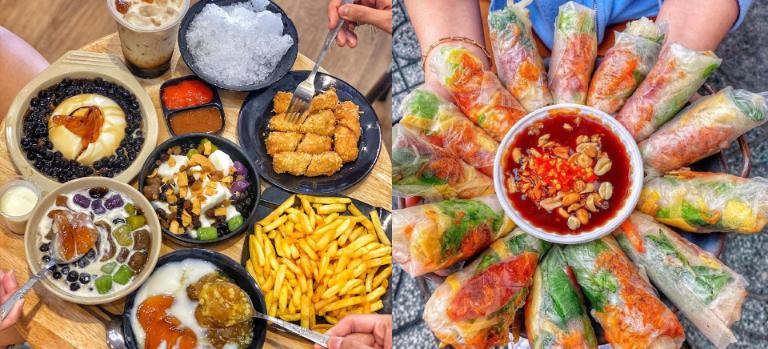
Why Vietnamese Street Food is a Must-Try Culinary Adventure
Vietnam is more than simply a place; it’s a kitchen that lives and breathes. The street food culture is the heart of the country. It’s a complex mix of tradition, flavor, and everyday life that can’t be replicated in a formal dining environment. The sidewalk in Vietnam isn’t only a place to promenade; it’s also the country’s most democratic, lively, and tasty dining room. You could go to a Michelin-starred restaurant, but you wouldn’t get the actual taste of Vietnamese food. It’s on the busy sidewalks where you may find the real art, the recipes that have been passed down through the generations, and the most authentic local experience.
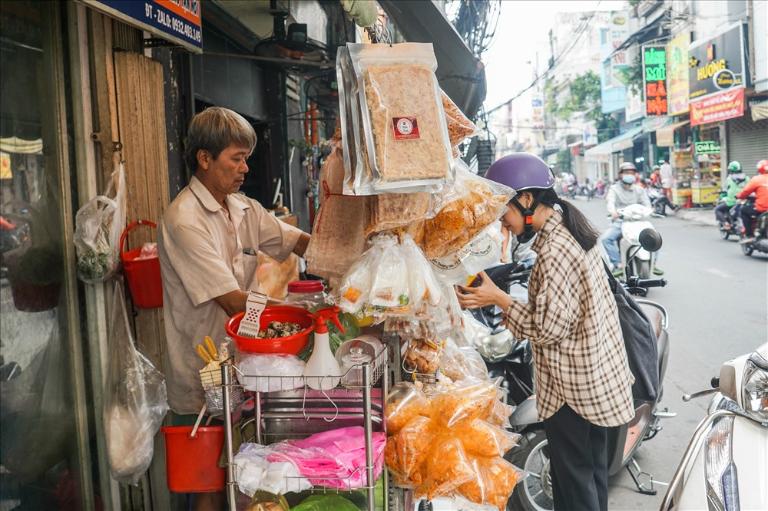
A Symphony of Flavors Mastering Balance and Freshness
The magic of Vietnamese street food resides in its perfect balance of five main flavors—spicy, sour, bitter, salty, and sweet—often blended in a single bite. Ingredients are kept fresh and made to order, ensuring lively taste and texture. From the smells of ginger and lemongrass to the sizzling sounds and crunch of herbs, each dish is a perfect gastronomic symphony.
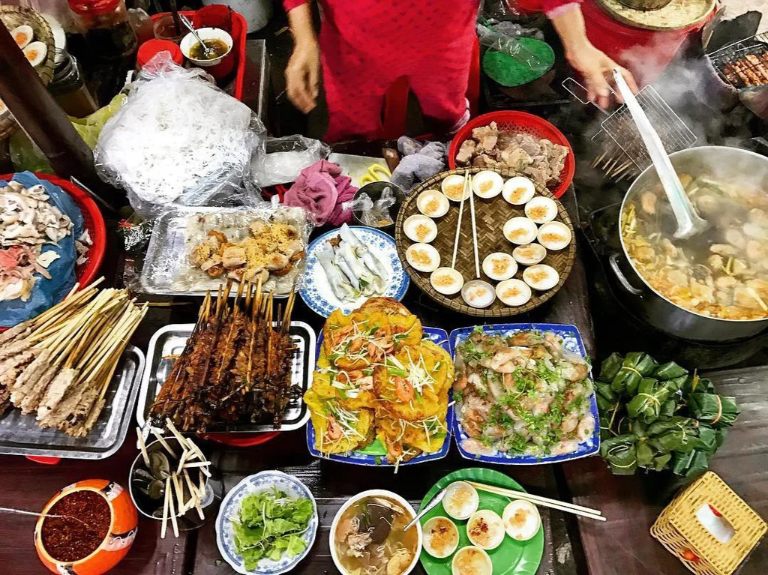
The Cultural Hub Experiencing Local Culture
For Vietnamese people, eating at a street stall is more than just a quick, cheap lunch; it’s an important social event. People meet acquaintances, families get together, and life tales are spoken over low plastic stools at sidewalk booths. You become part of the local rhythm by sitting there, and you get to experience the closeness, genuineness, and community spirit of Vietnamese daily life that no restaurant can match.
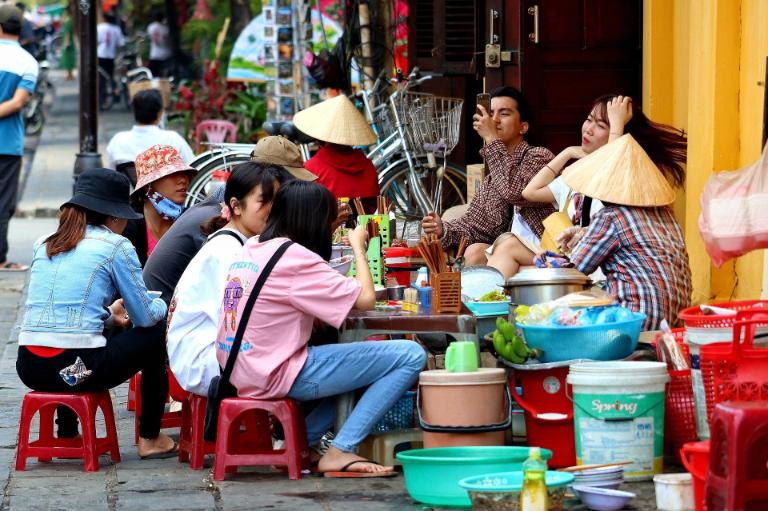
>>> Let’s see: Famous Street Food Dishes in Hanoi: A Guide to Must-Try Delicacies
Spotlight on Vietnamese Delicacies: Your Essential Tasting List
Before we even get to the how of ordering, let’s talk about the what. Understanding a few key dishes will give you the confidence to approach any stall and know exactly what culinary masterpiece you are asking for. Don’t limit yourself to the familiar; the best meals are often the ones you haven’t heard of.
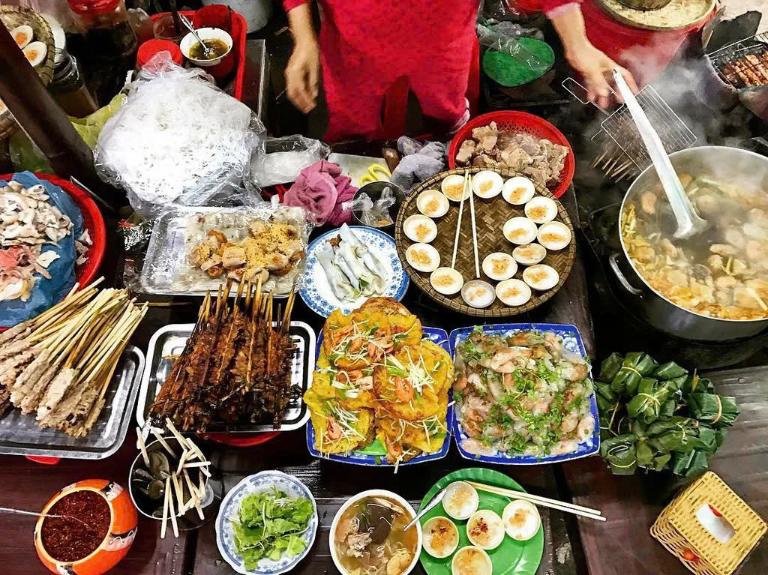
Bun Dau Mam Tom
Bun Dau Mam Tom is a distinctly Northern specialty that’s not for the faint of heart, but utterly addictive. It features deep-fried tofu, soft vermicelli noodles, and various pork cuts (sometimes including blood sausage) served with the notorious, pungent fermented shrimp paste. This dish is all about contrast—the crispy, light tofu against the soft noodles, all dipped into the powerful, umami-rich Mắm Tôm that is usually mixed with chili and lime. If you are brave enough, this is an unforgettable, intense flavor journey that demands respect and a daring palate.
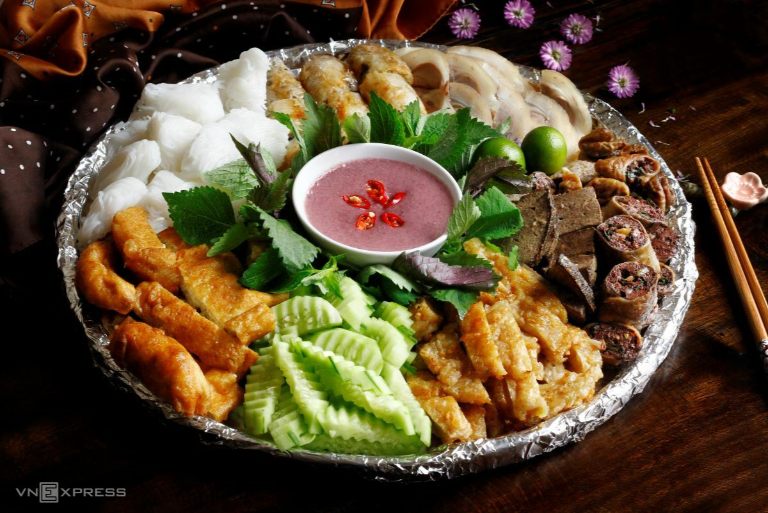
Pho
Pho is a type of Vietnamese noodle soup that is considered by many to be the most famous bowl of soup in the world. The key is the 10-hour broth that is cooked with star anise, ginger, and cinnamon. It can be beef (Pho Bo) or chicken (Pho Ga). It smells good, makes you feel good, and everyone loves it. When you order Pho from street food booths in Vietnam, you get a bowl that is meant to be simple. You can add fresh ingredients like basil, mint, bean sprouts, lime, and different sauces right at the table. Don’t be shy; add a lot of toppings to balance out the thick broth!
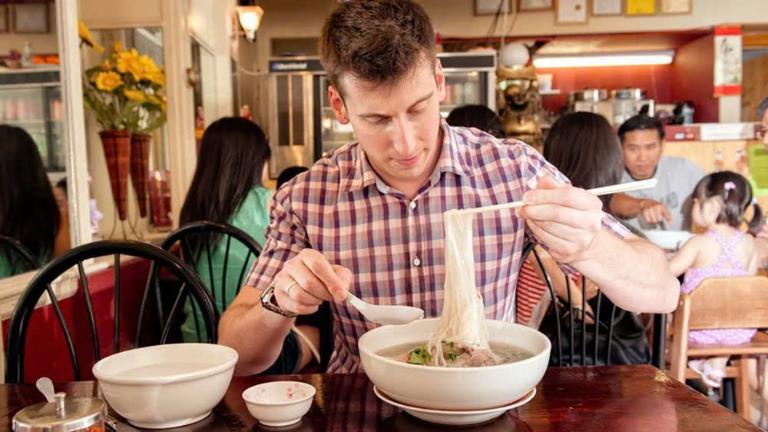
Banh Cuon Thanh Tri
Banh Cuon Thanh Tri refers to delicate, steamed rice paper rolls. The ultra-thin, almost translucent sheets of steamed rice batter are typically filled with seasoned ground pork and wood ear mushrooms, then topped with crispy fried shallots. It is served with a light dipping sauce. It’s a breakfast staple known for its delicate, nearly translucent texture and subtle flavor profile, offering a refreshing and soft contrast to many of the heavier noodle dishes. Look for specialized stalls that are cooking these sheets fresh on a cloth steamer.
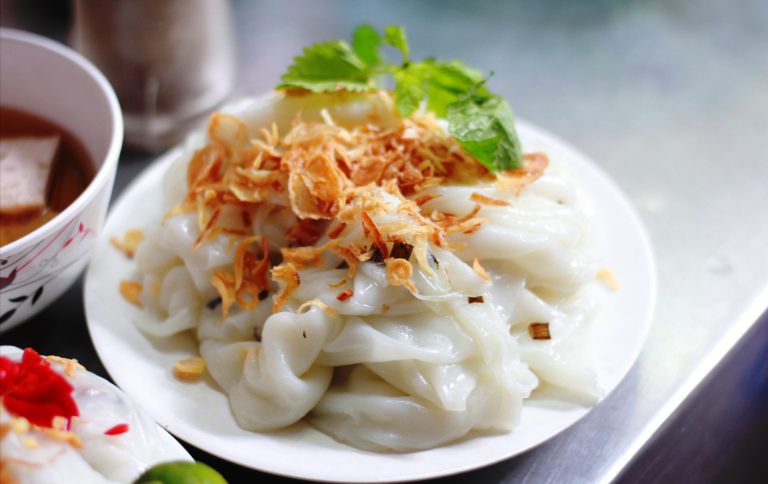
Goi Cuon (Fresh Spring Rolls)
Goi Cuon, or Fresh Spring Rolls, stand apart from their fried counterparts. These translucent rolls are packed with fresh shrimp, herbs, pork, and rice vermicelli, wrapped tightly in rice paper, and dipped in a rich peanut sauce or light Nước Chấm. They are the definition of light and fresh Vietnamese food, perfect for a quick snack or starter, providing a burst of cool, crisp flavor with every bite. They are an excellent, safe choice for first-time street food adventurers due to their simple, uncooked assembly.

Bun Cha
Bun Cha is the famous dish of Hanoi, consisting of perfectly grilled pork patties and slices of savory pork belly. These meats are served submerged in a bowl of warm, sweet and sour dipping sauce (which cleverly doubles as the broth), accompanied by a side of cold rice noodles and fresh herbs. This dish gained global fame after being shared by President Obama and Anthony Bourdain, cementing its status as a must-try. The smoky, caramelized flavor of the pork mingling with the cool herbs and tangy broth is simply sublime.
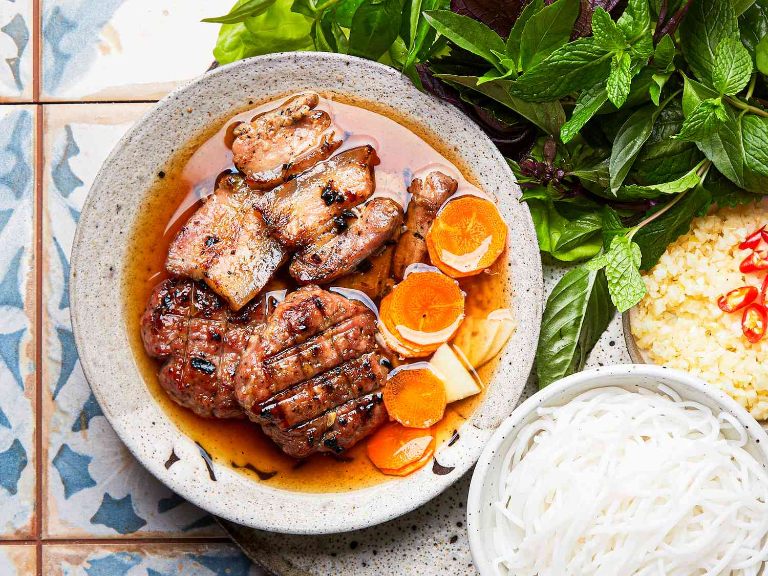
Essential Tips and Considerations for Navigating Vietnamese Street Food
It can be too much to take when you walk through a crowded Vietnamese area. Motorbikes go by quickly, merchants yell, and signs are usually only in Vietnamese. With a little help, like from a helpful staff member at a Motorbike Rental in Vietnam, you can get over the initial shock and start finding safe, wonderful street food. By following a few basic tips that locals practice every day, you may quickly move from being a scared tourist to a confident street food adventurer.
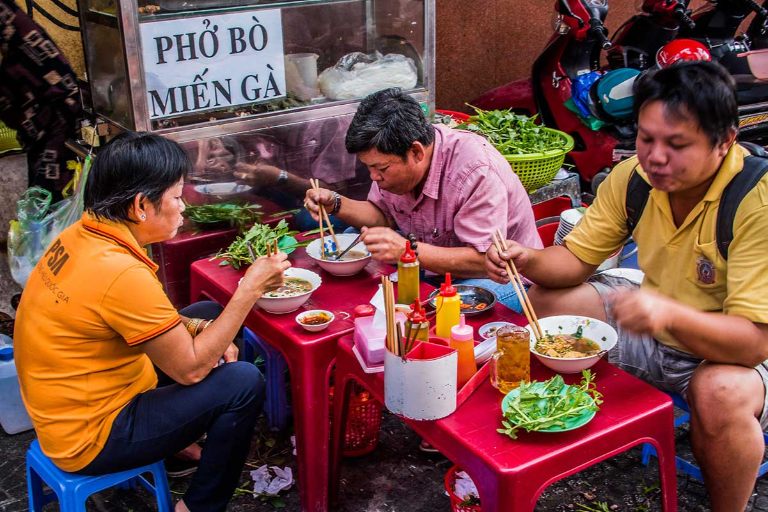
Spotting a Winner: Relying on Crowds and Cleanliness
The first rule of street food is easy: go where the crowd goes. If a stall is bustling, it usually signifies the food is fresh and good. If it’s empty, you should probably stay away. Look at the cooking area. It’s a good sign if the seller is actively cleaning up their space, cooking food to order, and rinsing off their utensils. Follow your gut; a busy, energetic stand is nearly always the best pick.

Mastering the Ordering Process and Essential Vietnamese Phrases
You choose a stall and a seat. Now it’s time to order. Pointing helps, but saying things like “Cho tôi một tô [Dish name]” is more polite and speeds up service. Get some tiny bills ready, cash is king, and don’t forget to pay after your meal. You don’t have to tip, but rounding up for good service is nice.
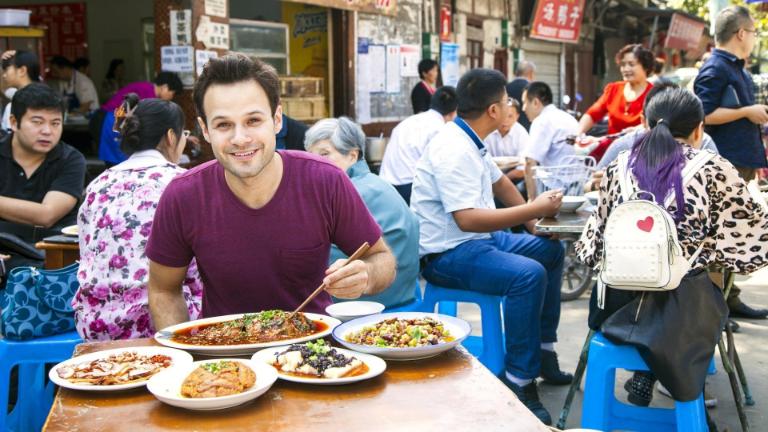
Customizing Your Meal: Communicating Needs Without Words
You can still customize your food even if you don’t speak the same language. The language barrier can be a fun game of charades. Patience and excitement, together with a simple pointing gesture, are your best tools. If you know the name of the food, a simple nod when you mention it will do the trick. You can change your food after you order it by using simple modifiers, especially when it comes to heat:
- No spice or chili: Không ớt (Kohm uht) or Không cay (Kohm kye).
- Thêm thịt (Them thit) means “extra meat.”
- No herbs or vegetables: Kohm row. In the busy streets of Vietnam, a grin and confident body language are the best ways to communicate.
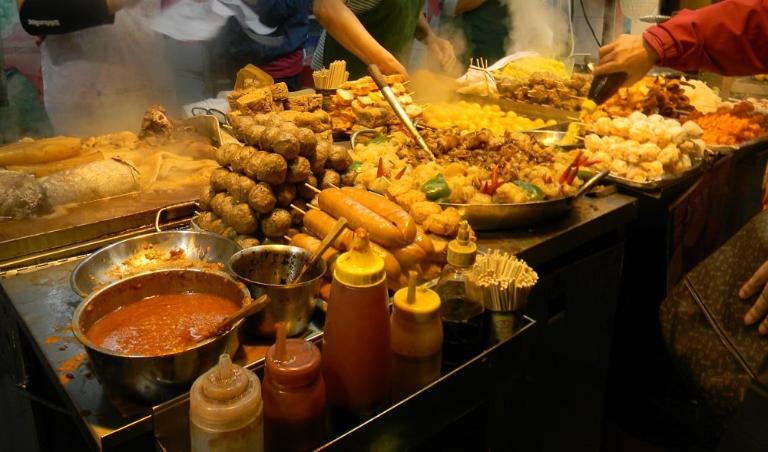
Safety First: Mindful Choices Regarding Water, Ice, and Raw Produce
Hygiene is always the main worry for first-timers, but you may greatly lower the risk by making smart decisions. Keep an eye on these three things:
- Ice (Đá / Dah): Look for ice that is clear and cylindrical with a hole in the middle. This means it was made with clean water and sold.
- Water: Always drink bottled water. It’s cheap and easy to find.
- Raw Vegetables: The fresh herbs (rau) are what give the dish its flavor, however they are generally washed in tap water. If your stomach is sensitive, only eat foods where the vegetables are cooked. The most important safety guideline is Eat where the meal is very hot. Heat is good for you. Soups, stir-fries, and anything that comes right off the grill are great choices.
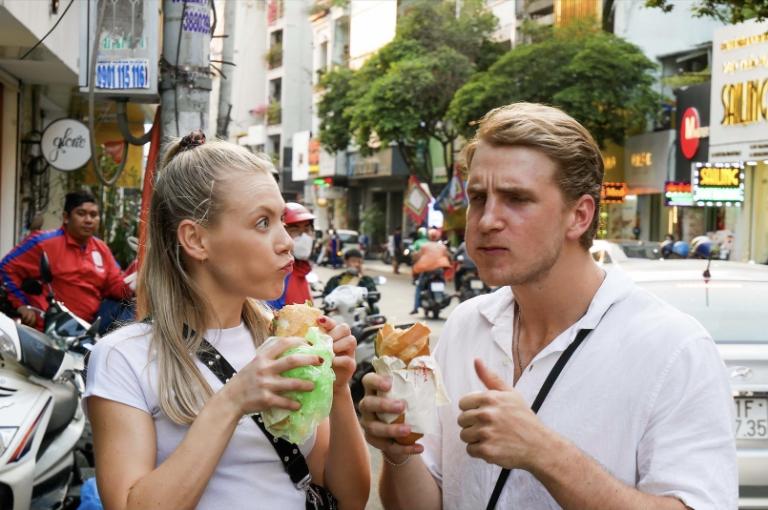
Embracing the Street Food Adventure with Confidence
Don’t let fear paralyze you; the risk is small compared to the reward. By choosing busy, popular stalls where food turnover is high, and sticking to cooked items, you’ve already lowered your risk dramatically. Many experienced travelers also swear by taking a daily probiotic supplement a few weeks before and during their trip to help their gut adjust. At the end of the day, part of the thrill is embracing the delicious, chaotic reality of street food stalls in Vietnam. You are stepping into an authentic experience, and a few small precautions are all you need to ensure an unforgettable (and comfortable) journey.
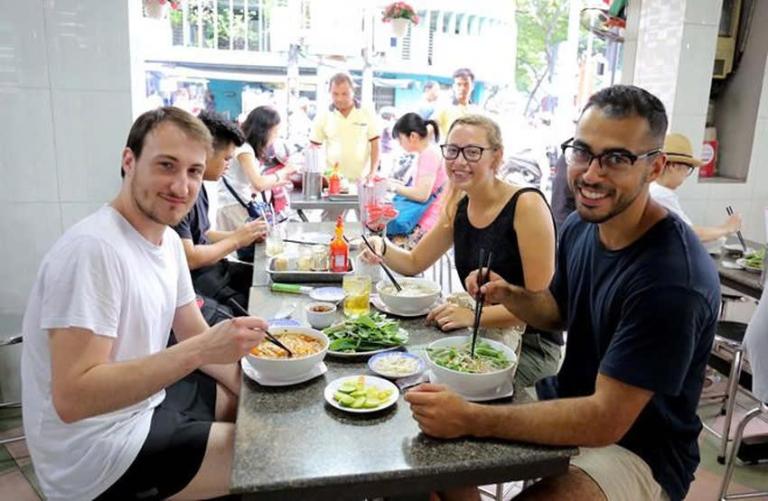
The truth is, there’s no grand secret to mastering the art of the street food stall in Vietnam. It’s a beautiful mix of common sense, a dash of courage, and a willingness to step outside your comfort zone. The food is magnificent, the experience is unforgettable, and the stories you’ll collect are priceless. Go ahead. Choose a stall with a crowd, practice your Xin chào and Cảm ơn, and sit down on that tiny plastic stool. You’re not just ordering a meal; you’re diving headfirst into one of the world’s most exciting and delicious culinary cultures. What are you waiting for? The aromas are calling your name.
Related posts:
- Best Street Food in Hanoi: Where to Find the Must-Try Dishes
- Best Food Tours in Hanoi | Taste Vietnam’s Culinary Delights
- Exploring Ta Hien Beer Street: The Heart of Hanoi’s Nightlife
- How to Drink Vietnamese Coffee Like a Local | Experience Authenticity







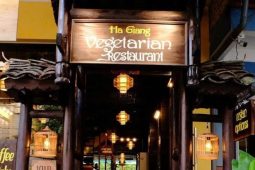
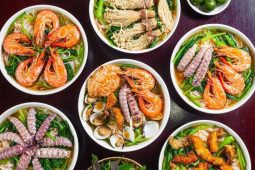

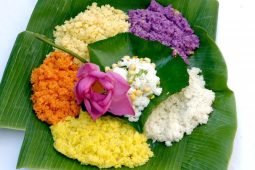



Be the first to comment!